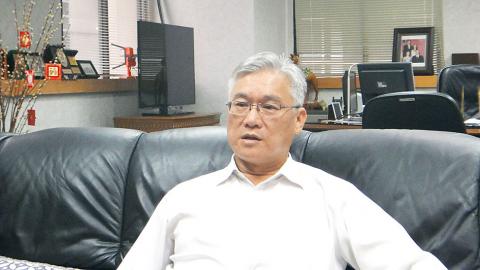Representative to Indonesia Andrew Hsia (夏立言) yesterday was named deputy minister of the Ministry of National Defense in charge of policy, drawing mix reactions from lawmakers.
At a question-and-answer session in the legislature, Premier Jiang Yi-hua (江宜樺) said that Hsia would be tasked with overseeing arms procurement policies, a position that has been vacant for about two months.
The position was left vacant on Aug. 1 when former vice minister of national defense Andrew Yang (楊念祖) was promoted after former minister of national defense Kao Hua-chu (高華柱) resigned over public outrage at the death of army corporal Hung Chung-chiu (洪仲丘), who died from alleged abuse. Yang resigned from his new post days later.

Photo: CNA
Chinese Nationalist Party (KMT) Legislator Chen Ken-te (陳根德) questioned Hsia’s qualifications for the job because of the “lack of professionalism” in defense-related affairs he showed as he fielded questions during the session.
Jiang said that the appointment was made after consultations with President Ma Ying-jeou (馬英九), the Ministry of Foreign Affairs and the defense ministry.
Hsia has the expertise required for the position, which is similar to his predecessor’s, Jiang said.
Minister of National Defense Yen Ming (嚴明), who succeeded Yang, said he welcomed having more experienced diplomats in the ministry.
According to the Executive Yuan, Hsia will be the third civilian deputy defense minister under the Ma administration since May 2008, following Yang and Representative to Israel Chang Liang-jen (張良任).
KMT Legislator Lin Yu-fang (林郁方) praised the appointment.
Hsia, previously stationed in New York, is fluent in English and experienced in dealing with the US government, while also possessing a broad knowledge of international politics, which qualifies him to be a deputy defense minister, the key person who communicates with the US about arms procurement policies, Lin said.
Democratic Progressive Party Legislator Hsiao Bi-khim (蕭美琴) said the appointment was “illogical” because Hsia lacked experience in handling defense-related affairs and was not well-acquainted with such issues.
There is no comparison between Yang and Hsia because Yang specialized in military strategy before he entered the ministry, Hsiao said.
Hsia resigned as deputy minister of foreign affairs in August 2009 after a cable sent by the Ministry of Foreign Affairs instructing foreign missions to decline all forms of foreign aid in the aftermath of Typhoon Morakot was disclosed by a newspaper, sparking a public backlash.
Elsewhere, Vice Minister of Education Chen Te-hua (陳德華) is to succeed Deputy Minister of Education Chen Yi-hsing (陳益興), while Council of Indigenous Peoples Chief Secretary Chen Cheng-chia (陳成家) was appointed deputy minister of the council, the Executive Yuan said in a statement.

Taiwan is stepping up plans to create self-sufficient supply chains for combat drones and increase foreign orders from the US to counter China’s numerical superiority, a defense official said on Saturday. Commenting on condition of anonymity, the official said the nation’s armed forces are in agreement with US Admiral Samuel Paparo’s assessment that Taiwan’s military must be prepared to turn the nation’s waters into a “hellscape” for the Chinese People’s Liberation Army (PLA). Paparo, the commander of the US Indo-Pacific Command, reiterated the concept during a Congressional hearing in Washington on Wednesday. He first coined the term in a security conference last

DEFENSE: The National Security Bureau promised to expand communication and intelligence cooperation with global partners and enhance its strategic analytical skills China has not only increased military exercises and “gray zone” tactics against Taiwan this year, but also continues to recruit military personnel for espionage, the National Security Bureau (NSB) said yesterday in a report to the Legislative Yuan. The bureau submitted the report ahead of NSB Director-General Tsai Ming-yen’s (蔡明彥) appearance before the Foreign and National Defense Committee today. Last year, the Chinese People’s Liberation Army (PLA) conducted “Joint Sword-2024A and B” military exercises targeting Taiwan and carried out 40 combat readiness patrols, the bureau said. In addition, Chinese military aircraft entered Taiwan’s airspace 3,070 times last year, up about

A magnitude 4.3 earthquake struck eastern Taiwan's Hualien County at 8:31am today, according to the Central Weather Administration (CWA). The epicenter of the temblor was located in Hualien County, about 70.3 kilometers south southwest of Hualien County Hall, at a depth of 23.2km, according to the administration. There were no immediate reports of damage resulting from the quake. The earthquake's intensity, which gauges the actual effect of a temblor, was highest in Taitung County, where it measured 3 on Taiwan's 7-tier intensity scale. The quake also measured an intensity of 2 in Hualien and Nantou counties, the CWA said.

The Overseas Community Affairs Council (OCAC) yesterday announced a fundraising campaign to support survivors of the magnitude 7.7 earthquake that struck Myanmar on March 28, with two prayer events scheduled in Taipei and Taichung later this week. “While initial rescue operations have concluded [in Myanmar], many survivors are now facing increasingly difficult living conditions,” OCAC Minister Hsu Chia-ching (徐佳青) told a news conference in Taipei. The fundraising campaign, which runs through May 31, is focused on supporting the reconstruction of damaged overseas compatriot schools, assisting students from Myanmar in Taiwan, and providing essential items, such as drinking water, food and medical supplies,